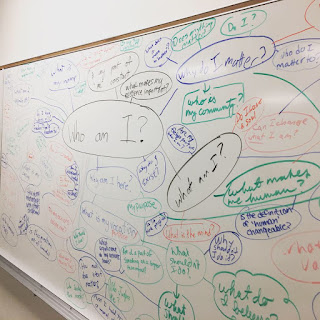Three Observations on "The Future of Humanity"
 |
| Class Project: What are the thousand questions that are included in the one question, Who am I? |
1. Narrative and Human Identity. The transhumanist movement is founded on a pre-scientific narrative about what it means to be human, and where the human project is going. As communications professor James Harrick puts it, "mythos precedes logos". That is, the claims, policies, and agendas set by the transhumanist project are animated by an often-unacknowledged story about where humans came from and where they are inevitably going. Science and technology are used to support and confirm this pre-scientific narrative about what the good life entails. Genetic editing and engineering is no different. What was important for our students to recognize is that more often than not, the implicit narrative of technological advancement is antithetical to the Christian understanding of what a human life is for--in some cases overtly. Additionally, we discovered that many of the antithetical western narratives about human identity, human nature, and the purpose for life have been co-opted into some Christian visions of the good life. That is to say, that many Christians have been more shaped by the scientific vision (narrative) of the good life than the big, unified story of Scripture and the the life of the Triune God. This is one of the fundamental reasons why we require two courses for all our students at LeTourneau University: Biblical Literature (where we outline the overarching narrative of the Bible and our place in God's mission for the world) and Biblical Theology for Life (where we attend to God's self-revelation as Father, Son, and Holy Spirit and what difference that makes for understanding our vocation, or calling in life).
2. The Need for Virtue Ethics. Most discussions about emerging technology (especially gene editing and transhumanism) inevitably lead to debates about ethics. Our students noted that all of the current discussions on ethics are extremely limited because they only work from one of two ethical frameworks--deontological ethics (duty) or consequentialism (pro/cons). As important as these two approaches are, they are severely limited because they do not attend to the bigger questions of life: what are the necessary conditions for a good life? What is human nature? What am I (are we) made to become? Additionally, they seem to give preference to the decision that needs to be made over and against the bigger question of what kind of people we are becoming in making these decisions. Again, in order to answer those kinds of questions, one needs a comprehensive and clear vision of what human life is for. One of the reasons that virtue ethics is no longer involved in ethical discussions is because as a society we have less confidence about these ultimate questions and/or we have been encouraged to discover and define our own purpose for life, often without any access to tradition or theology. In our increasing dependence upon technology and the evasiveness of technology in all areas of our lives, it is imperative that Christians attend to the clear vision for the purpose of humanity and the means to reach that goal. Unfortunately, all evidence points in the opposite direction. Christians these days seem to have reflected less on this question than at any other time in history, which leads to the final observation.
3. The Need for a Robust Liberal Arts Education. In one class exercise I wrote a question on the board: who am I? I then asked students to write down the thousand other questions that are included in that one question. We didn't get to a thousand, but their questions revealed the complex, multi-disciplinary education we need in order to understand who we are and why we are here. Metaphysics, epistemology, theological anthropology, sociology, psychology, the history of western thought, church history (just to name a few) are all necessary fields of knowledge to go along with our understanding of these emerging technologies and the way in which they are being applied. What is troubling about this is that today in the modern university these are precisely the kinds of courses and departments that are being cut from university budgets in the quest to be practical and professionally-oriented. To put it bluntly we are approaching a "perfect storm" scenario: as we are growing exponentially in our capabilities to change, modify, and manipulate our world, we are also exponentially growing ignorant in our understanding of what it means to be human or even how people over time have wrestled with this question.
One of the great opportunities we have at LeTourneau, a school that brands itself as "The Christian Polytechnic University", is to offer students a world-class STEM education that includes a thoroughly Christian vision for human flourishing, informed by the liberal arts and understood through Jesus Christ, who holds all things together (Colossians 1.17). So help us, God.


Comments
Post a Comment